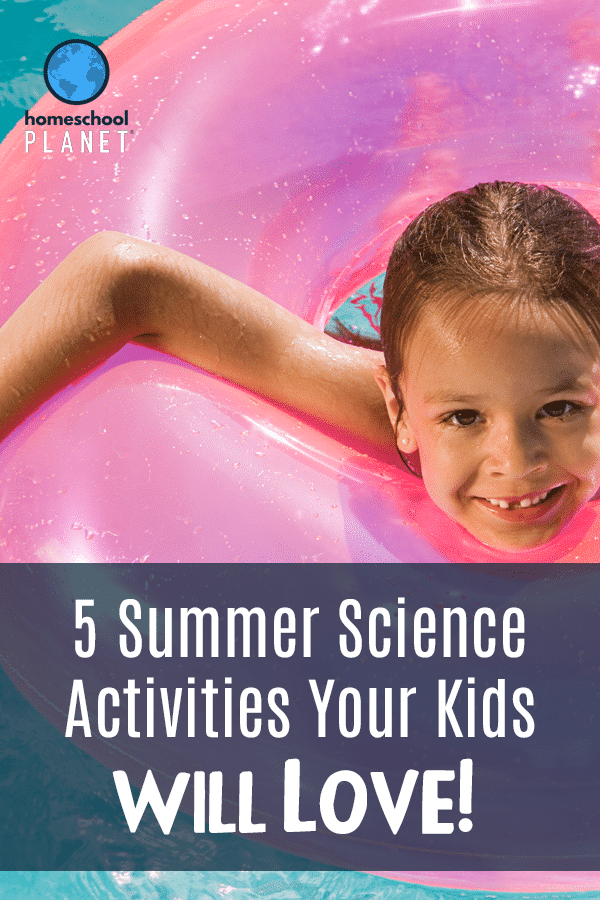5 Summer Science Activities Your Kids Will Love
Looking for a relaxed, fun way to learn this summer?
Summer is the very best time of year to try out new learning activities. Going outside is a must and experimenting with fun science experiments can be a great way to sneak in a little education during the summertime (and avoid any mess inside!).
Your kids will have a blast outdoors and you’ll love that they are actually learning!

Homeschooling Year-Round Vs. Taking A Summer Break
Some families homeschool year-round with a few breaks throughout the year. Others take a summer break or sporadic breaks for vacations or around specific events. Homeschooling allows us the freedom to be sporadic, to adjust, and to do what works well for our families.
Whatever school year you choose to have, summertime seems to be a period when your students can do more outside. It is just the perfect time to do some goofy, funky, let’s-get-dirty homeschool science activities outdoors.
Summer Is Perfect For Science
What is great about science activities, especially during the summer, is that they can incorporate other subjects like writing, and nature studies which make for fun learning that defeats the summer slide.
For those who don’t know, the summer slide is the phrase used to describe a slide backward many kids make in educational skills during the summer. Encouraging your child to dedicate time to summertime learning, with a splash of fun and laughter in it, brings educational benefits and lasting memories. Especially when returning to a regular schedule after the break.
5 Summer Science Activities Your Kids Will Love
Help your kids experience a summer full of fun activities they will enjoy! These summer science activities your kids will love are a great way to start:
Ocean Science and Water Play
Spark curiosity in kids to find out more about ocean currents, like the East Australian Current, and how they are formed. This ocean currents science experiment is a fun way to see currents form right before your child’s eyes.
Butterflies and Summer Life Science
Head outside and learn how to raise beautiful native butterflies from the caterpillars in your very own backyard with this step-by-step backyard butterfly activity.
Candy and Chemistry
Is a childhood, really a childhood without making a Mentos/soda explosion? I think not. The best thing about this experiment is that scientists aren’t exactly sure what causes the explosion. This leaves room for hypothesis and research for your kids.
Cool Down and Learn
Kids can explore chilly science experiments on a warm summer day. This Ice Volcano Experiment is a great way to cool down and learn about science while playing.
The Physics of Water
Learn about centrifugal force while building this simple pump. It will help kids understand machines such as washing machines and vacuums.
Find Your Favorite Homeschool Science Publishers in our Homeschool Planet Marketplace!
Homeschool Planet provides Lesson Plans, for the following science programs. You can use these to continue the fun!
Nancy Larson Science This is a complete hands-on elementary science curriculum with challenging content that engages elementary-age students and is easy to teach. This curriculum works with lessons in a logical sequence, building vocabulary, making language arts connections, and review/assessments.
Apologia Elementary Science Apologia’s Elementary Science is a creation-based science curriculum taught with a Christian worldview. Apologia develops curriculum to help families cultivate a biblically sound approach to all thought and experience.
Apologia Science 7th-12th Grade – Apologia’s Science 7th – 12th grade is a creation-based science curriculum taught with a Christian worldview. Apologia develops curriculum to help families cultivate a biblically sound approach to all thought and experience.
Berean Builders – Berean Builders is a hands-on, multilevel elementary science series that introduces scientific concepts using history as its guide. Because each lesson is built around an activity or experiment, it is engaging for all K-6 students. In each Berean Builder course, students are reminded of the Creator who fashioned the marvels they are studying.
Supercharged e-Science – The Supercharged e-Science Curriculum is self-guiding, so your kids can do it on their own. It is also very hands-on, so they are engaged in exciting lessons doing real science as real scientists do in the lab. Your kids will learn more science AND enjoy it more in 2 months than they would from a typical year of “traditional” science education.
Birds in Our Backyard – Introduce your children to the wonderful world of birds in their back yards and give them a greater understanding of our environment in the process. They will have fun, connect with the natural world, and make many fascinating discoveries.
BJU Press Science – With the BJU Press Science curriculum, your children will learn to explore God’s creation, investigations of our universe, the structure and inhabitants of the earth, along with the mechanisms of cells and atomic reactions.
LIFEPAC Science – With LIFEPAC Science, your students will develop observational skills as they study the created physical universe. There are four intriguing significant strands of this particular curriculum which include Life Science (plants and animals, human anatomy and personal care, biology), Space and Earth Science (geology, weather, space), Physical Science (chemistry, physics), and the nature of science (scientific method, experimentation, technology).
The Magic School Bus – The Magic School Bus is an educational resource full of science facts alongside fun, engaging, and entertaining lessons. It is a great hands-on learning and educational science kit for boys and girls that encourage STEM learning for ages 5+.
Rod and Staff Science – Rod and Staff Science curriculum provides a robust and solid foundation to science topics and concepts. The material is presented in story form, describing science concepts and facts in the context of a rural community with a Christian point of view. Experiments are simple and consist of materials you can easily find around your home.
Thinkwell Science – Thinkwell core curriculum subject areas taught via video-based learning materials. They give educators and students all the tools, technology, and content they need to succeed.
Have you figured out what science curriculum you will use next school year? Are you trying out any cool science experiments this summer? Drop some science activity links in the comments section to share with other homeschooling families.


